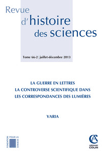
Revue d Histoire des Sciences
Scope & Guideline
Chronicling the Evolution of Scientific Ideas.
Introduction
Aims and Scopes
- Interdisciplinary Historical Analysis:
The journal focuses on the historical development of various scientific disciplines, encouraging interdisciplinary approaches that incorporate philosophy, sociology, and cultural studies. - Biographical Studies of Scientists:
It emphasizes biographical approaches, exploring the lives and contributions of significant figures in science, such as Louis Pasteur and Evariste Galois, to understand their impact on scientific progress. - Philosophical Reflections on Science:
The journal frequently integrates philosophical inquiries into scientific concepts, such as the nature of infinity in mathematics and the philosophical history of physics, providing a deeper understanding of scientific thought. - Critical Examination of Scientific Practices:
It critiques the evolution of scientific methodologies and practices, often reflecting on historical controversies and the socio-political context surrounding scientific advancements. - Exploration of Historical Texts and Manuscripts:
The journal publishes analyses of historical scientific texts, manuscripts, and treatises, shedding light on the intellectual traditions and debates that shaped the sciences.
Trending and Emerging
- Ecological and Environmental Studies:
Recent publications have increasingly addressed the relationship between science and ecology, such as the exploration of community concepts in ecological projects, reflecting a growing awareness of environmental issues in historical contexts. - Interdisciplinary Approaches to Science:
There is a rising trend in interdisciplinary studies that bridge gaps between fields, such as the connections between literature and science, showcasing the journal's commitment to broadening its analytical frameworks. - Reevaluation of Historical Scientific Concepts:
Emerging themes include critical reevaluations of historical scientific concepts, such as infinitesimal analysis and theories of order, which indicate a deeper engagement with the philosophical implications of scientific ideas. - Focus on Global Perspectives in Science:
The journal is increasingly incorporating global perspectives, examining the cross-cultural influences on scientific development, as seen in studies of Islamic contributions to science, which highlight a more inclusive historical narrative.
Declining or Waning
- Natural Philosophy:
There has been a noticeable decrease in papers focusing specifically on natural philosophy, as the field has increasingly integrated with more specialized scientific disciplines, reducing the standalone exploration of philosophical underpinnings. - Traditional Historical Narratives:
The journal appears to be moving away from traditional historical narratives that merely chronicle scientific developments in a linear fashion, favoring more complex analyses that connect science with broader cultural and philosophical contexts. - Studies on Specific Historical Figures:
While biographical studies remain relevant, there is a waning interest in exhaustive studies of individual scientists from earlier periods, as the focus shifts towards collective movements and interdisciplinary themes.
Similar Journals
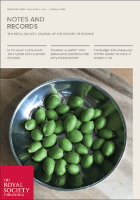
Notes and Records-The Royal Society Journal of the History of Science
Illuminating the Evolution of Scientific ThoughtNotes and Records - The Royal Society Journal of the History of Science is an esteemed scholarly journal published by the Royal Society in the United Kingdom, focusing on the historical aspects of science and its impact on modern scientific practices. With an ISSN of 0035-9149 and E-ISSN 1743-0178, this journal serves as a vital platform for researchers, professionals, and students who seek to explore the intricate connections between historical developments and contemporary scientific discourse. Recognized for its academic rigor, it holds a commendable position in the Q3 category of the History and Philosophy of Science field, ranking #56 out of 223 according to Scopus, and showcasing a 75th percentile ranking. Covering converged years from 1970 to 1973 and from 1975 to 2024, the journal publishes articles that contribute significantly to the understanding of the evolution of scientific thought. While it currently does not operate under an open access model, its esteemed content continues to engage a broad readership, fostering a deeper appreciation for the history behind scientific innovation and inquiry.

Historical Studies in the Natural Sciences
Connecting Historical Perspectives with Modern Scientific ThoughtHistorical Studies in the Natural Sciences is a prestigious journal published by University of California Press, dedicated to advancing the understanding and appreciation of the interconnections between natural sciences, history, and philosophy. With an ISSN of 1939-1811 and an E-ISSN of 1939-182X, this journal has established itself as a vital resource for researchers, professionals, and students interested in the historical context and philosophical implications of scientific developments. As of 2023, it holds an impressive Q3 ranking in the category of History and Philosophy of Science and ranks 76th in the Arts and Humanities domain according to Scopus, representing the 65th percentile among peers. The journal spans a convergence of studies from 2008 to 2024, offering insights that bridge gaps between historical perspectives and scientific inquiry. Open access options enhance its accessibility, fostering a broader dialogue within the academic community and beyond. This journal stands as an important platform for scholars aiming to explore the rich tapestry of natural sciences through a historical lens, contributing significantly to the ongoing discourse in the field.
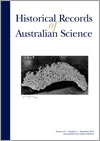
Historical Records of Australian Science
Preserving the Narrative of Scientific Progress.Historical Records of Australian Science is a premier academic journal published by CSIRO PUBLISHING, focusing on the rich legacy and contributions of Australian science from its inception to contemporary advancements. The journal is integral to the Arts and Humanities and Social Sciences fields, operating within a unique niche that fosters interdisciplinary dialogue and research. With its ISSN 0727-3061 and E-ISSN 1448-5508, it encompasses a diverse scope spanning historical analysis, philosophy of science, demography, and human factors. Although it is currently categorized into Q3 and Q4 quartiles across various relevant spheres in 2023, the journal strives for excellence in archiving pivotal scientific milestones as it continues to publish valuable insights, encouraging submissions from scholars globally. Its commitment to enriching scholarly discussion makes it a crucial resource for researchers, professionals, and students keen on exploring the historical narratives that have shaped Australia’s scientific landscape. With a convergence of knowledge from 1980 through to 2024, the Historical Records of Australian Science stands as a vital repository for those delving into Australia’s scientific heritage.
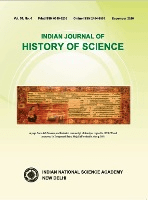
INDIAN JOURNAL OF HISTORY OF SCIENCE
Charting Historical Pathways in Science and TechnologyINDIAN JOURNAL OF HISTORY OF SCIENCE, published by the Indian National Science Academy, offers a vital platform for researchers, professionals, and students dedicated to the exploration of the historical development of science and technology in India and beyond. With the ISSN 0019-5235 and E-ISSN 2454-9991, this peer-reviewed journal aims to promote interdisciplinary collaboration by publishing original research articles, reviews, and discussion papers that highlight the contributions and evolution of scientific thought throughout history. The journal fosters a unique understanding of how historical contexts have shaped current scientific paradigms, making it an essential resource for academic inquiry. Although it does not currently offer Open Access options, the journal's rigorous editorial standards ensure that it maintains a significant impact within the scholarly community, serving as a crucial reference point for historical scholarship in the sciences. Its address in Bahadur Shah Zafar Marg, New Delhi 110 002, India, situates it within a rich tapestry of cultural and academic heritage, further enhancing its significance in the field.

Journal for General Philosophy of Science
Unraveling the Philosophical Threads of Scientific PracticeJournal for General Philosophy of Science, published by Springer, stands as a pivotal resource in the fields of History and Philosophy of Science, as well as general Philosophy. With an impressive Q1 ranking in its categories and a solid reputation reflected in its Scopus rankings, this journal provides a robust platform for scholarly discourse and advancement in philosophical inquiry regarding science. The journal's commitment to quality is evident, catering to researchers, professionals, and students interested in the critical examination of scientific methods, theories, and their implications. While it operates on a subscription basis, the journal is dedicated to fostering a deeper understanding of philosophical issues surrounding scientific practices from 1980 through 2024. Operating out of the picturesque Netherlands, specifically from VAN GODEWIJCKSTRAAT 30, 3311 GZ DORDRECHT, the journal continues to encourage innovative thinking and interdisciplinary dialogue, underscoring its significance in academia today.
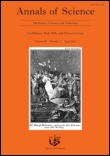
ANNALS OF SCIENCE
Charting the Course of Scientific Ideas Through TimeANNALS OF SCIENCE, published by Taylor & Francis Ltd, is a pivotal journal in the field of the History and Philosophy of Science, as evidenced by its Q3 categorization and a respectable Scopus rank of 99 out of 223, placing it in the 55th percentile among its peers. With a rich history dating back to its initial publication in 1936, the journal has made significant contributions to scholarly discourse, providing a platform for researchers and academics to explore the intricate connections between scientific developments and philosophical inquiries. The journal's commitment to rigorous academic research ensures that it remains a vital resource for professionals, educators, and students dedicated to understanding the evolution of scientific thought. Although it operates under traditional subscription models, the journal's importance in shaping modern scientific discussions cannot be overstated, making it an essential read for those engaged in the multifaceted study of science's history and philosophical implications.
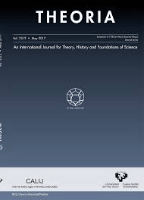
THEORIA-REVISTA DE TEORIA HISTORIA Y FUNDAMENTOS DE LA CIENCIA
Elevating Understanding of Science's Historical RootsTHEORIA-REVISTA DE TEORIA HISTORIA Y FUNDAMENTOS DE LA CIENCIA, published by the Servicio Editorial Universidad del País Vasco, is a leading open access journal dedicated to advancing the fields of History, Philosophy of Science, and related disciplines since its inception in 2003. With a robust impact factor placing it in the esteemed Q1 and Q2 quartiles in its respective categories, this journal serves as a crucial platform for researchers, professionals, and students who are engaged in profound discussions and analyses of scientific foundations and historical contexts. Based in Spain, THEORIA has consistently demonstrated its commitment to scholarly excellence, achieving notable rankings in Scopus, particularly in the fields of Arts and Humanities, where it holds a rank of #169 in Philosophy and #59 in History and Philosophy of Science. The journal not only allows immediate open access to its diverse range of articles, fostering global knowledge dissemination, but also aims to bridge connections across varied philosophical inquiries and historical explorations within science. Join the dialogue today in shaping the future understanding of our scientific heritage.

Spontaneous Generations-Journal for the History and Philosophy of Science
Unraveling the Threads of Scientific Thought Through TimeSpontaneous Generations: Journal for the History and Philosophy of Science is a dedicated publication focusing on the rich fields of history and philosophy within the scientific domain. Published by the Institute for the History and Philosophy of Science and Technology, this journal provides a vital platform for scholars, researchers, and students to explore and disseminate ideas that bridge the historical context and philosophical inquiries of scientific practices. With its commitment to open access, Spontaneous Generations ensures that groundbreaking research is widely available, fostering an environment of collaboration and knowledge sharing. Aiming to engage a diverse audience, this journal is pivotal for those looking to understand the evolution of scientific thought and its implications on contemporary issues, making it an essential resource in the academic community.

PHILOSOPHY OF SCIENCE
Fostering Scholarly Dialogue in the Philosophy of SciencePHILOSOPHY OF SCIENCE, published by Cambridge University Press, serves as a premier journal at the intersection of history, philosophy, and science, making significant contributions to our understanding of scientific inquiry and its historical contexts. With an impressive impact factor reflected in its 2023 Category Quartiles—ranking Q1 in History, Q1 in History and Philosophy of Science, and Q1 in Philosophy—this journal stands out as a vital resource for researchers, professionals, and students alike. Operating without Open Access, it encourages the dissemination of groundbreaking ideas from 1949 through 2024, illustrated by its robust Scopus rankings, including a remarkable 98th percentile in the History category. Based in the United Kingdom at the prestigious Cambridge campus, PHILOSOPHY OF SCIENCE is committed to fostering scholarly dialogue and advancing critical thought in the philosophy of science.

ARCHIVE FOR HISTORY OF EXACT SCIENCES
Illuminating the Philosophical Foundations of Exact SciencesARCHIVE FOR HISTORY OF EXACT SCIENCES, published by Springer, is an esteemed journal committed to promoting the understanding of the historical and philosophical dimensions of exact sciences, including mathematics and its application to various scientific fields. With a heritage dating back to 1964, this journal not only maintains a robust academic reputation in Germany but also reaches an international readership, reflected in its Scopus rankings, where it holds a commendable position in the 71st percentile for History and Philosophy of Science. The journal presently falls within Q3 and Q4 quartiles for its respective categories in 2023, highlighting its ongoing relevance and contribution to academia. As researchers, professionals, and students seek to explore the intricate relationships between mathematics, philosophy, and history, ARCHIVE FOR HISTORY OF EXACT SCIENCES serves as a key resource, fostering interdisciplinary dialogue and stimulating new inquiries in the complex landscape of science.